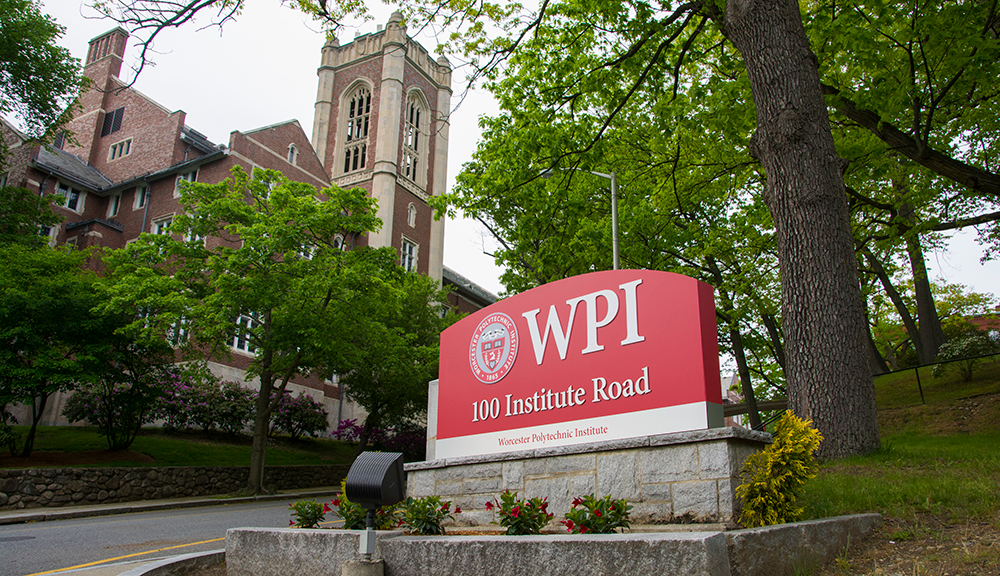WORCESTER, Mass. – Worcester Polytechnic Institute (WPI) Professor David B. Dollenmayer will be honored next month by the German cultural organization Goethe-Institut with the prestigious annual Helen and Kurt Wolff Translator’s Prize for his German-to-English translation of the poet Moses Rosenkranz’ Childhood: An Autobiographical Fragment (Kindheit. Fragment einer Autobiographie). The honor will be presented to Dollenmayer by the consul general of Germany in Chicago, Wolfgang Drautz, on Monday, June 9 at the Chicago Cultural Center.
The Helen and Kurt Wolff Translator’s Prize, one of the foremost prizes in the nation for works translated from German into English, honors an outstanding literary translation published the previous year in the United States. Dollenmayer, who teaches German in WPI’s Department of Humanities and Arts, will receive $10,000 and a three-month stay at the Literarisches Colloquium Berlin in Germany. The prize, funded by the German government, was established in 1996 and is administered by the Goethe-Institut Chicago, an organization that internationally promotes German culture and language study.
"David Dollenmayer’s translation of this memoir by a poet unknown in the English-speaking world conveys a vivid picture of life among Jews in the last days of the Austro-Hungarian monarchy," said Rüdiger van den Boom, director of the Goethe-Institut Chicago. "He captures with great sensitivity and skill the lively, often poetic, sometimes ironic, always unexpected style of the original. To translate this text Dollenmayer had to familiarize himself with the setting, and make sense of Rosenkranz’ elliptical and imaginative account of a childhood in which privation, cruelty, and danger might well have destroyed a less resilient spirit. Thanks to Dollenmayer, this extraordinary document is now accessible to readers who will find its perspective, language, and content fascinating."
A five-member judging panel selected Dollenmayer to receive the award for his translation of Rosenkranz’ book, a childhood memoir that opens a window onto a world that vanished with World War I: the Buconvina, in the easternmost province of the Autro-Hungarian Empire. Rosenkranz survived the Holocaust and 10 years in the Soviet Gulag Archipelago and wrote the memoir when he was released in 1958. Dollenmayer’s translation was published in 2007 by Syracuse University Press.
"Moses Rosenkranz’ book is written in unique and powerful German, and I hope my translation conveys some of the language’s strange fascination," said Dollenmayer, whose primary research interests are the translation of contemporary German authors’ works; and 18th, 19th, and 20th century German literature and culture. "I think my work is typical of the kinds of things being done by my other colleagues in WPI’s Humanities and Arts Department. My experience has always been that WPI students approach the humanities and arts with the same openness, curiosity, and enthusiasm they display in their science and engineering courses and in their research projects."
Dollenmayer is the author of The Berlin Novels of Alfred Döblin (University of California Press, 1988) and co-author with Thomas Hansen of Neue Horizonte: A First Course in German Language and Culture (Houghton Mifflin, 7th edition, 2008). In addition to Kindheit by Moses Rosenkranz, he has published translations of works by Bertolt Brecht (Flüchtlingsgespräche), Perikles Monioudis (Im Äther), Anna Mitgutsch (Haus der Kindheit), and Michael Kleeberg (Der König von Korsika). His translations of Mietek Pemper’s Der rettende Weg: Schindlers Liste – die wahre Geschichte will appear this fall, and of Peter Stephan Jungk’s Die Reise über den Hudson next spring. He is currently at work on a translation of Veza and Elias Canetti’s Briefe an Georges as well as, with Susanne Even, a bilingual young adult novel.
Dollenmayer earned his B.A. and Ph.D. degrees from Princeton University, and began teaching at WPI in 1988.
About Kurt and Helen Wolff
Kurt Wolff, joined later by his wife Helen, was one of the most outstanding and innovative publishers in Germany of the 1920s. Helen and Kurt Wolff immigrated to New York in 1941 and founded Pantheon Books, a publishing house mainly devoted to the translation of German and other European literature. In 1961, the couple joined the firm Harcourt Brace Jovanovich where they became co-publishers with their own imprint "Helen and Kurt Wolff Books." Upon her husband’s death in 1963, Helen Wolff continued to work with authors on the Wolff list, expanding it to include Karl Jaspers, Walter Benjamin, Uwe Johnson, Günter Grass, Max Frisch, Jurek Becker, Hans Joachim Schädlich, and many others.
Helen Wolff was recognized for her work with an Inter Nationes Award, the Goethe-Medaille, and honorary doctorates from Mount Holyoke, Smith, and Dartmouth colleges. In 1994 she was awarded the Friedrich Gundolf Prize by the Deutsche Akademie für Sprache und Dichtung (German Academy for Language and Literature) for her promotion of German culture in the United States, and for making German literature accessible to American readers. Helen Wolff died in 1994.




